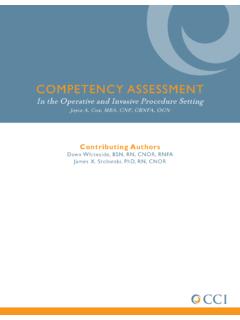Transcription of Practicum Competencies FINAL 3-07
1 The Practicum Competencies Outline: Report on Practicum Competencies The Association of Directors of Psychology Training Clinics (ADPTC) Practicum Competencies Workgroup The Council of Chairs of Training Councils Practicum Competencies Workgroup Robert L. Hatcher, & Kim Dudley Lassiter, Modifications based on discussion by the Council of Chairs of Training Councils (CCTC) Practicum Competencies Workgroup and by members of the CCTC at its meeting on March 25, 2004 in Washington, DC, & discussion by 42 Clinic Directors at the Midwinter Meeting of the ADPTC, Miami FL, February 27, 2004. Nadya Fouad, and Barbara Cubic, provided specific wording for some categories.
2 Further revisions based on comments from the CCTC meeting of November, 2004; Jeffrey Binder, ; Division 29 Executive Committee. Revision Date: October 24, 2006. For a full introduction to this document, please refer to: Hatcher, R. L. & Lassiter, K. D. (2007). Initial training in professional psychology: The Practicum Competencies Outline. Training and Education in Professional Psychology, 1, 49-63. Aims and Uses of this Report The Association of Directors of Psychology Training Clinics (ADPTC) has Practicum training as its main focus. The ADPTC recognizes the importance of defining, training for and assessing core Competencies in psychology.
3 The motivation for preparing this document arises from these values. Please see Hatcher & Lassiter (2007) for a fuller discussion of the aims and uses of this document. Aims of this document 1. To assemble and organize descriptions of currently identified core Competencies for the professional psychologist. 2. To characterize the levels of competence in these core domains that are expected at the beginning of Practicum training and at the end of Practicum training, prior to beginning internship. Potential uses for this document: 1. Assist in developing Practicum training programs by defining competency goals.
4 2. Assist in communication between Practicum sites and graduate programs regarding training goals. 3. Develop competency assessments for Practicum trainees. 4. Provide a basis for evaluating outcomes for Practicum training programs. 5. Stimulate thinking concerning competency goals for more advanced training. Scope and applicability of this document 1. This document covers an extensive set of Competencies , most of which have been endorsed more or less strongly by various groups in professional psychology as required for a fully competent psychologist. 2. We recognize that professional psychology as a whole has not endorsed a list of Competencies regarded as essential for the fully competent professional psychologist.
5 1. 3. We recognize that individual psychology programs, depending on their educational goals, will likely select a subset of the Competencies listed below that reflect the thrust of their program's goals. This point should be stressed, lest readers conclude that every Practicum program should teach all of the Competencies described below. The aim of this document is to provide a comprehensive account of relevant Competencies , which can inform a program's effort to develop and implement its own training model. In its Guidelines and Principles for Accreditation of Programs in Professional Psychology (2005), the APA notes that The accreditation process involves judging the degree to which a program has achieved the goals and objectives of its stated training model.
6 That is, an accreditation body should not explicitly prescribe a program's educational goals or the processes by which they should be reached (Section ). Sources for this Document Please see Hatcher & Lassiter (2007) for a fuller discussion of the sources for this document. This document is based on the work of the ADPTC Competencies Workgroup, with input from the CCTC Competencies Workgroup and the CCTC itself. It draws on many sources. Key are reports from two conferences held by psychology educators: The 2001 American Psychological Association (APA) Education Leadership Conference, with its Workgroup on Practicum Competencies , whose report may be found at ; and the APPIC.
7 Competencies Conference: Future Directions In Education And Credentialing In Professional Psychology, held in November 2002 in Scottsdale AZ, whose report may be found at An explicit decision was made not to seek consensus of the total Competencies Conference group on the specification of Competencies for psychologists. Although the present document assembles specifications for Competencies into one document, we are not claiming consensus on which of these Competencies are core, or essential Competencies for the field (see point #3 under Scope and applicability of this document above). Describing Levels of Competence Please see Hatcher & Lassiter (2007) for a fuller discussion of the levels of competence described in this document.
8 A guiding principle for this Competencies document was that Practicum training should prepare the psychology student to make effective use of the internship. We worked to specify the level of competence in the various skill domains that would characterize a well-prepared beginning psychology intern. This approach is based on a doctoral level training model (vs. terminal masters) and assumes that clinical work will begin only after the student has had a period of classroom- based preparation. We recognize that not all programs endorse or adhere to this model. A second guiding principle for the document was that psychology students should be adequately prepared to begin Practicum .
9 We describe the various qualities and skills that we believe should be present in students who begin Practicum training. We have found that it is important to recognize that Competencies are acquired at different rates. Some Competencies , such as administrative or supervisory skills, may come slowly and later in professional development. Other more basic Competencies , such as timeliness, ability to utilize supervision, etc., may be expected and/or required to be substantially attained very early in training. These differences in the rate of development are reflected in the level of competence expected at the conclusion of Practicum training.
10 One of the most widely used schemes for describing the development of competence is that of Dreyfus and Dreyfus (1986), who define five stages, from Novice to Advanced Beginner to Competent to Proficient to Expert. The Dreyfuses' overall idea (in common with many other skill development and competency models) is that as the learner becomes more and more familiar with the analytic and action tasks of the field, performance becomes more integrated, flexible, efficient and skilled. Patterns and actions that have to be carefully thought about and/or taught by supervisors become internalized and increasingly automatic.



